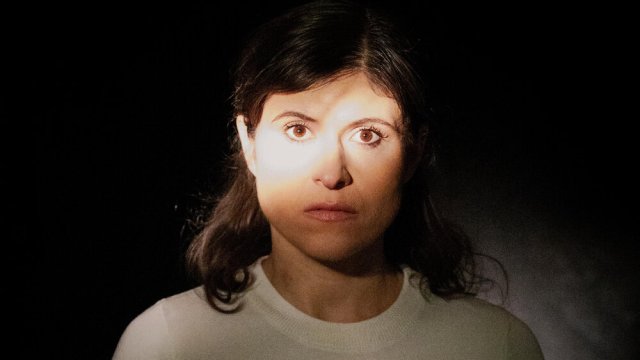“Homesick for what” – questions from the daughter about the story
Photo: tipp-berlin.de
The Berlin grandmother was murdered in Auschwitz in 1943, the mother was one of the young people rescued to England in 1938, where she became a member of the FDJ and the illegal KPD, which were first founded there. The young woman, 17, was unable to bring her mother to England with her and save her from the German murderers of Jews – a tragedy that tormented her daughter until her own death.
While she was still in exile, she married a man who also survived the Shoah thanks to the Kindertransport. With him and their first child together, she returned to Germany after the war, to East Berlin, became a member of the SED and a public prosecutor in the young state of the GDR. Its demise in 1989/90 does not leave them unaffected. In moments of inner excitement, a viola sounds on stage. Mendelssohn and Schubert, but also GDR children’s songs can be heard.
Wera Herzberg staged Goethe’s “Iphigenie” at the Volksbühne in 1991, whose divine mission was to pacify the horrors of a family tragedy. Now, as an author and director, she deals with the dramatic history of her own family. Her piece “Homesick for What” is based on Mascha Kaleko: “The pain remained, the home was gone. Wera Herzberg shows the pain, the loss, the feeling of not being at home anywhere. Fates of our sore past and present. The daughter confesses: “I missed Jewishness.”
Wera Herzberg, born in 1949, the year the GDR was founded, as the second child of Shoah survivors, enriches the family’s happiness, but it does not last forever. The mother, a convinced communist and state official, clearly recognizes the suppression of independent thinking and the killing of initiatives in this state. It fights the ossification and hardening of conditions and comes into contradiction with the system it serves. When her marriage, which had previously been based on political understanding and solidarity, broke up, the mother herself became harsh and often became a family tyrant in everyday life.
The daughter’s dialogue with her mother is characterized by sincerity, especially in those moments when the child perceives certain situations critically. “People looked so suspicious,” she remarks, when her mother, the public prosecutor, was handed special packages over the counter at the butcher or greengrocer. The mother herself sees these as deserved privileges. The attitude towards the sense and nonsense of school education also separates the two. The mother, who started school in the Weimar Republic, had experienced the humanistic education reform of the time, loved her school, but was no longer able to attend because her parents lacked money. The daughter hated her school, which tried to force her to be a socialist role model and demanded obedience.
The fact that the story remains lively and exciting until the end is due to the clear sincerity of what is told. The author uses letters and tapes, authentic documents. The mother’s enthusiasm for communism is credibly conveyed, her enthusiastic hope that now, after the murder of millions of Jews that took her mother away, and the terrible war, a humane world freed from exploitation, poverty and injustice will emerge. Her daughter is also caught up in the enthusiasm of the revolutionary songs. The mother fervently quotes Brecht: communism is “the simple thing that is difficult to do.” The daughter changes the sentence to: “The hard thing that just can’t be done.” Faith was not passed on from mother to daughter.
Premiere. The hall is full and everyone is listening intently. The final applause is sustained and gratifying. Because of sincere enlightenment.
“Homesick for something”, home port Neukölln; further dates: January 21st/22nd, February 13th/14th and March 7/8, 7 p.m.; €18.50, reduced €15.
